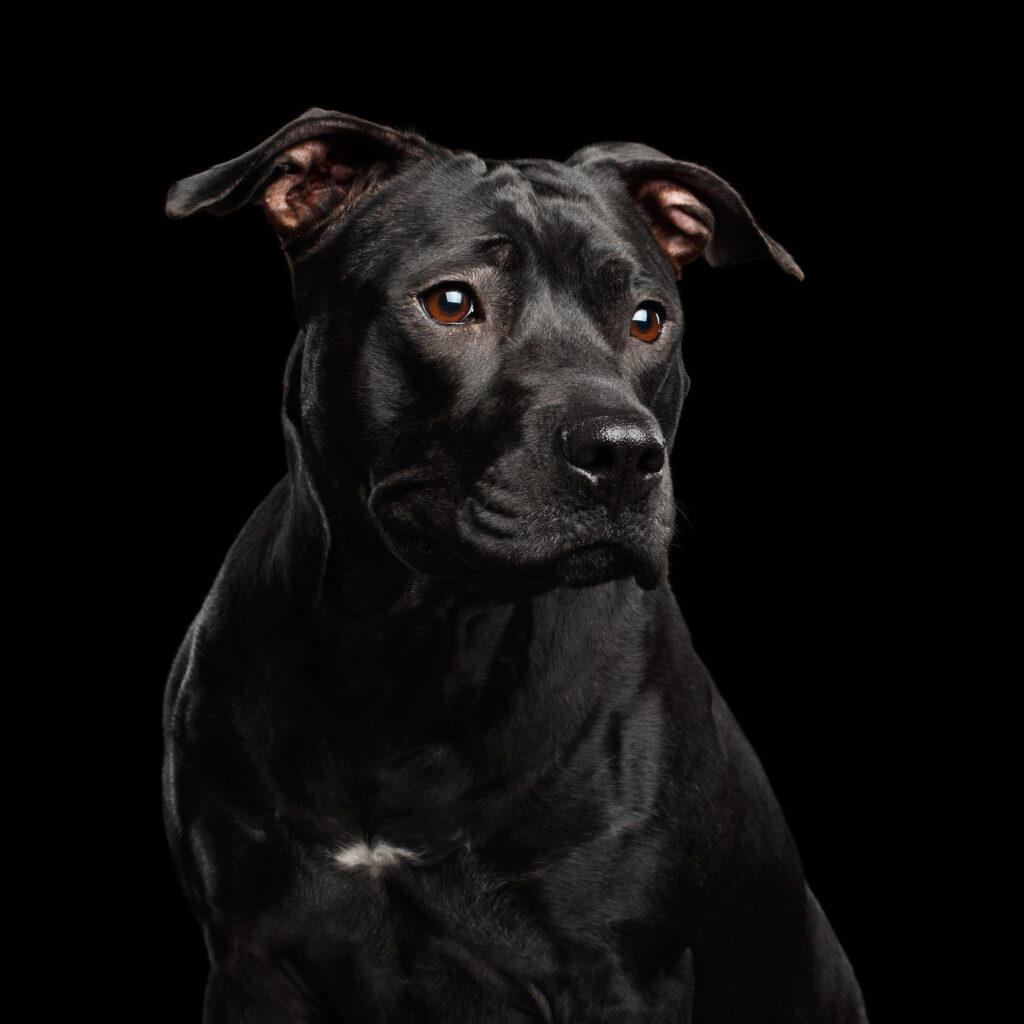Our website is supported by our users. We sometimes earn money when you click an affiliate link and make a purchase. This is at no extra cost to you and helps us to create quality content. Thank you for your support. For all that have shown us such wonderful support, we thank you from the bottom of our hearts!
If you’re considering adopting a dog, you may have heard of the Black Pitbull. This color variant of the American Pitbull Terrier is a popular breed, known for its loyalty and affectionate nature. However, due to its history as a fighting dog, the breed has a controversial reputation.
Despite this reputation, Black Pitbulls can make great family pets when properly trained and socialized. They are intelligent and eager to please, making them easy to train. However, it’s important to note that any dog, including the Black Pitbull, can be prone to certain health issues.
If you’re considering adopting a Black Pitbull, it’s important to educate yourself on the breed’s proper training and care, a Black Pit bull can be a loyal and loving companion for years to come.
History of Black Pitbulls
Black Pitties are not a specific breed of Pitbull. Rather, they are American Pitbull Terriers with a black coat. The Pitbull breed dates back to the United Kingdom in the 19th Century. They were bred from the Old English Bulldog and a terrier and were used for the cruel sport of bullbaiting.
The dogs were essentially pitted against bulls and would attack and pester the bull until it passed out from fatigue or as a result of its injuries.
Once bullbaiting was outlawed, Pitbulls found new roles as working dogs, assisting farmers and ranchers with tasks like herding and guarding livestock. They were also used as hunters, able to track and take down large game like wild boar. Pitbulls were brought to the United States in the 1800s, where they were used for similar purposes.
Over time, Pitbulls became popular as family pets due to their loyalty, intelligence, and affectionate nature. However, they have also been the subject of controversy due to their history of being used for dog fighting. Despite this, many Pitbulls continue to live happy, healthy lives as beloved family pets.
Black Pitbulls are a unique and beautiful variation of the American Pitbull Terrier on the exterior, internally, they are no different than white pitbulls. While they may be prone to certain health issues, with proper care and attention, they can live happy, healthy lives as beloved family pets.
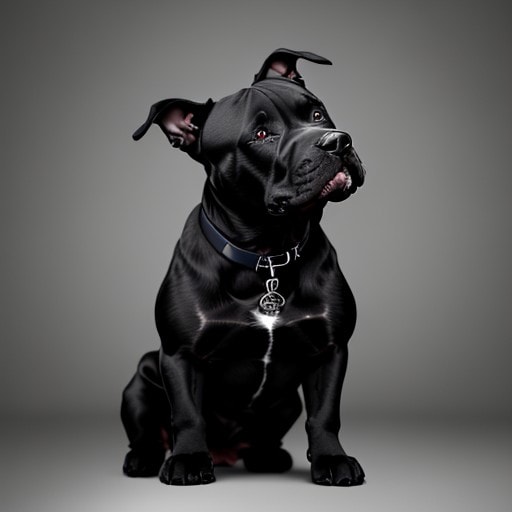
Physical Characteristics of the Black Pitbull
When it comes to physical characteristics, this dog is a muscular and athletic breed that possesses a powerful physique and a deep chest, displaying their strength and agility. Here are some sub-sections that describe their physical characteristics in detail:
Height
Their height of the can vary depending on the type of Pitbull. On average, they stand between 14-21 inches tall at the shoulder level.
Weight
Their weight can also vary depending on the type of Pitbull. On average, they weigh between 29-60 pounds.
Coat Color
As the name suggests, the Black Pitbull has a solid black coat. However, they may also have white markings on their paws or chest. Black is on the list of the most common color but pitbulls with entirely black coats are rare.
Coat Type
These dogs have a short, dense coat that is easy to maintain. They do not require a lot of grooming, but regular brushing can help to keep their coat shiny and healthy.
Life Span
This dog has a life span of 13-15 years, which is longer than some other bully breeds.
Additionally, they are known for fleshy noses, powerful jaws and a square-shaped head.
It is important to keep your dog healthy by providing them with a balanced diet, regular exercise, and routine vet checkups.
Overall, the Black Pitbull is a muscular and athletic breed that is known for their strength, agility, and devotion. While they may be prone to certain health issues, with proper care and attention, they can live a long and healthy life.
Temperament and Training of the Black Pitbull
Temperament
Pitbulls in general, as a breed type, have a bad reputation for being aggressive dogs. All dogs, even Pomeranians can be known for aggression and have caused serious injury to humans. For the most part, these black dogs are given a bad rap.
The Black Pitbull is known for its loyalty to family members and affectionate nature towards its owners. They are highly intelligent, playful dogs with high energy. They are also known for their protectiveness and can be wary of strangers. However, this behavior can be managed with proper socialization and training.
It is important to note that the temperament of a dog is not solely determined by its breed or color. It is also influenced by factors such as genetics, environment, and training. Therefore, it is important to provide proper training and socialization to your Black Pitbull from an early age.
Training
Training a Black Pitbull requires patience, consistency, and positive reinforcement. They respond well to rewards such as treats, praise, and playtime. It is important to avoid punishment-based training methods as this can lead to fear and aggression.
Black Pitbulls are highly trainable and excel in activities such as obedience training, agility, and tracking. They also require mental stimulation to prevent boredom and destructive behavior.
Exercise Requirements
Black Pitbulls are an active breed and require regular exercise to maintain their physical and mental well-being. They enjoy activities such as walks, runs, and playtime. They also excel in activities such as agility and obedience training.
It is important to note that the exercise requirements of a Black Pitbull may vary depending on factors such as age, health, and individual temperament.
Therefore, it is important to consult with a veterinarian or a professional dog trainer to determine the appropriate exercise routine for your Black Pitbull.
Overall, the Black Pitbull is a loyal, affectionate, and highly trainable breed. With proper training, socialization, and exercise, they can make great companions for active families. However, it is important to provide proper care and attention to prevent and manage any health issues that may arise.
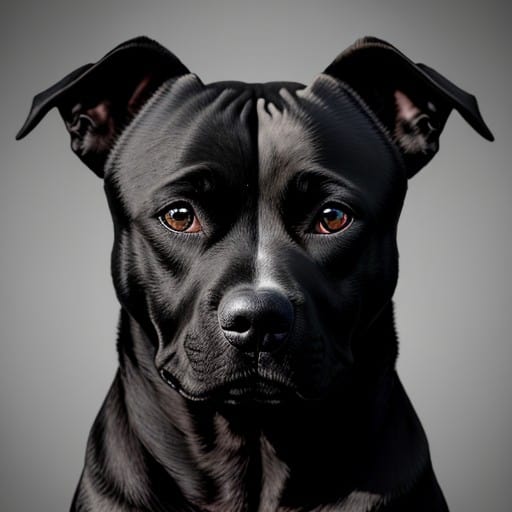
Health Issues of the Black Pitbull
As with any breed of dog, the Black Pitbull is prone to certain health issues. Here are some of the most common health problems that you should be aware of if you’re considering adopting a Black Pitbull:
Hip Dysplasia
This is a genetic condition that affects the hip joint, causing pain and discomfort. It’s more common in larger breeds of dogs, including the Black Pitbull. Symptoms of hip dysplasia include limping, difficulty standing up, and reluctance to exercise.
Skin Problems
Black Pitbulls are prone to skin allergies and irritations due to their short coats. Common skin problems include rashes, itching, and hot spots. Regular grooming and bathing can help prevent these issues.
Thyroid Problems
Hypothyroidism, a condition where the thyroid gland produces too little hormone, is common in Pitbulls. Symptoms may include weight gain, lethargy, and skin problems. Regular veterinary check-ups can help diagnose and treat thyroid problems early.
Cardiovascular Disease
Some Black Pitbulls may develop heart problems, including dilated cardiomyopathy and mitral valve disease. Symptoms may include coughing, shortness of breath, and weakness. Regular veterinary check-ups can help detect heart problems early.
Cataracts
Cataracts are a common eye problem in older dogs, including Black Pitbulls. Symptoms may include cloudiness or opacity in the eye, difficulty seeing, and bumping into objects. Regular veterinary check-ups can help detect cataracts early and prevent them from getting worse.
Remember, while Black Pitbulls may be prone to certain health issues, with proper care and regular veterinary check-ups, many of these conditions can be prevented or treated early.
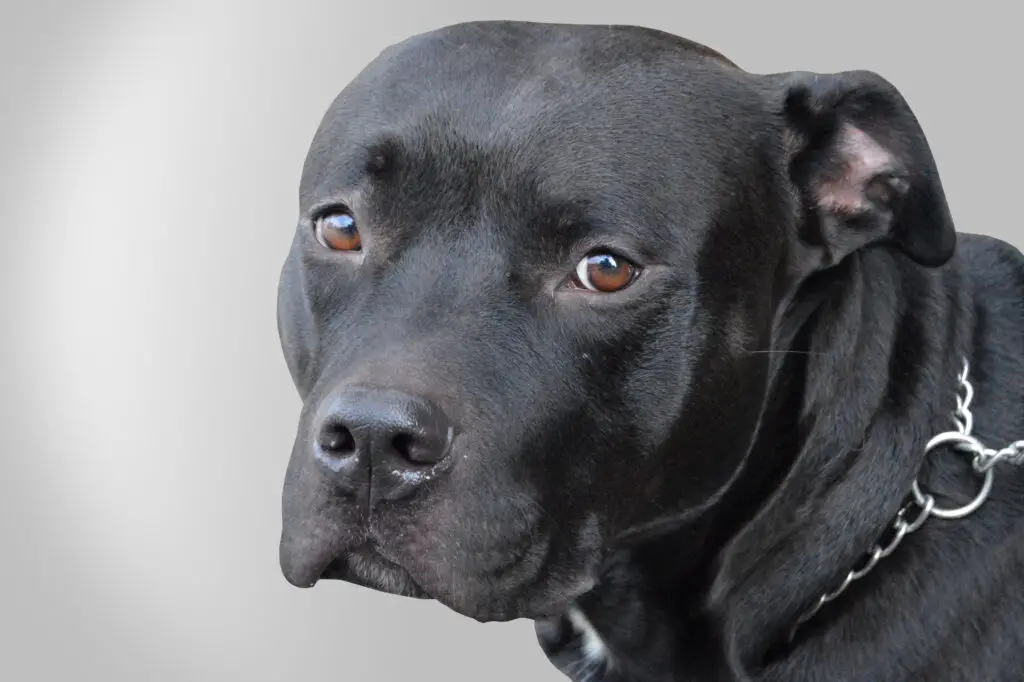
Grooming the Black Pitbull
Taking care of your black Pitbull’s grooming needs is important to keep them healthy and looking their best. Here are some important grooming tips to keep in mind:
Brushing
Regular brushing is essential to keep your black Pitbull’s coat shiny and healthy.
Use a slicker brush or a rubber grooming mitt to remove loose hair, dirt, and debris. Brushing also helps distribute natural oils throughout the coat, which keeps it moisturized and shiny.
Bathing
Bathing your black Pitbull once every three months is usually enough to keep them clean. Use a dog shampoo that is specifically formulated for their coat type and skin.
Be sure to rinse thoroughly to avoid any residue that could cause skin irritation.
Trimming Fur
Though this does not need to be done often, trimming your black Pitbull’s fur can help keep them cool during hot weather.
Use a pair of scissors or clippers to trim the fur around their ears, paws, and tail. Be careful not to cut too close to the skin, as this can cause injury.
Clipping or Grinding Nails
Regular nail clipping or grinding is important to keep your black Pitbull’s nails from becoming too long and causing discomfort. Use a pair of dog nail clippers or a nail grinder to keep their nails at a healthy length. Be careful not to cut the quick, which is the pink part of the nail that contains blood vessels.
If you’re not comfortable with clipping or grinding your dog’s nails yourself, you can always take them to a professional groomer or veterinarian for help.
But first, check out our article on How to Grind Your Dog’s Nails Safely.
To find the best grinder for your dog, check out this article on choosing a grinder.
Cleaning Ears
Cleaning your black Pitbull’s ears is important to prevent infections. Use a cotton ball or soft cloth to wipe the inside of their ears with a gentle ear cleaning solution. Or these convenient ear wipes.
Be sure to dry their ears thoroughly to prevent moisture buildup.
Grooming your black Pitbull regularly and keeping an eye out for any potential health issues can help keep them healthy and happy. With proper care and attention, your black Pitbull can be a loyal companion for years to come.
Owning a Black Pitbull
If you’re considering owning a Black Pitbull, there are a few things you should know before making a decision. This section will cover the cost of purchase, maintenance costs, adopting from shelters and the humane society, legal and ethical considerations, breed-specific legislation, and ethical breeding practices.
Cost of Purchase
You can purchase black pitbull puppies from reputable breeders with good bloodlines currently cost an average price range of $1500 – $4500. More questionable breeders may offer puppies for less than $1000, and breeders of famous Pit Bull breeds may ask as much as $55,000 a puppy.
Be extremely cautious about buying or paying for cheaper Pit Bulls. The better the breeder, the better and healthier the dog and, therefore, the higher price.
Maintenance Costs
The maintenance costs for a Black Pitbull are similar to other breeds. You will need to provide food, water, and shelter. You will also need to provide regular veterinary care, including vaccinations, check-ups, and treatments for any health issues that may arise.
Adopting from Shelters and the Humane Society
Adopting a Black Pitbull from a shelter or the humane society can be an affordable option. Adoption fees typically range from $100 to $300. Adopting a dog from an animal shelter, rescue center or the humane society can also be a rewarding experience, as you are giving a dog a second chance at a happy life.
Legal and Ethical Considerations
Black Pitbulls are often subject to breed-specific legislation, which can vary from state to state. It is important to research the laws in your area before owning a Pitbull. It is also important to be a responsible owner and to train and socialize your dog properly.
Breed-Specific Legislation
Breed-specific legislation is a controversial issue. Some people believe that certain breeds, including Pitbulls, are inherently dangerous and should be banned. Others believe that breed-specific legislation is unfair and ineffective. It is important to be aware of the laws in your area and to advocate for responsible dog ownership.
Ethical Breeding Practices
Ethical breeding practices are important for the health and well-being of dogs. Breeding should only be done by responsible breeders who prioritize the health and temperament of their dogs. It is also important to avoid breeding dogs with health issues, as this can lead to a higher risk of health problems in their offspring.
It is important to provide your Black Pitbull with regular veterinary care and to be aware of the signs of these health issues.
Owning a Black Pitbull can be a rewarding experience, but it is important to be aware of the costs and responsibilities involved. Whether you choose to purchase a puppy from a breeder or adopt a dog from a shelter or the humane society, it is important to be a responsible owner and to prioritize the health and well-being of your dog.
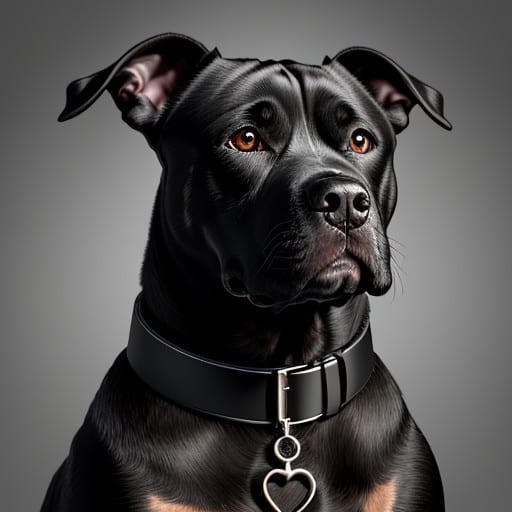
Frequently Asked Questions about the Black Pitbull
Is a Black Pitbull Rare?
Black Pitbulls are not necessarily rare, but a pitbull with fully black fur is less common than other colors of Pitbulls. According to PawSafe, black Pitbulls have a short, dense black coat with white markings on paws or the chest. However, they can also come in all different colors such as blue fawn and red and white. Merle pitbulls are exceptionally beautiful dogs that in many cases have beautiful blue eyes.
Does the American Kennel Club Recognize Pitbulls?
The American Kennel Club (AKC) does not accept “pitbulls or pit bulls” as a breed in its registry of purebred dogs. The American pit bull terrier is a breed that is recognized by the United Kennel Club; however, the word “pit bull” is more generally used to describe to mixed breed dogs that have particular physical characteristics, such as a muscular body and a large head.
Are Black Pitbulls Friendly?
Black Pitbulls can make great family pets when properly trained and socialized, according to Pawscessories. Like any breed, individual temperament can vary, but with proper care and attention, black Pitbulls can be loyal and friendly companions.
What Are Some Similar Breeds to the Black Pitbull?
Some similar breeds to the Black Pitbull include the American Staffordshire Terrier and the Staffordshire Bull Terrier, according to Dogwish. These breeds share similar physical characteristics and temperaments with the Black Pitbull.
It is important to stay up-to-date with regular vet check-ups and to provide proper care and nutrition to help prevent and manage these potential health issues.
The Bottom Line on the Black Pitbull
If you’re considering getting a Black Pitbull, it’s important to know that they are one of the most misunderstood dog breeds out there. Despite their robust and muscular body, they are not inherently dangerous or aggressive. In fact, they can be incredibly loyal and loving pets when trained and socialized properly.
When it comes to the controversy surrounding the Black Pitbull, it’s important to note that their color is purely cosmetic and has no impact on their temperament or behavior.
While some breeders may charge more for a Black Pitbull puppy, it’s important to ensure that you are not being scammed into purchasing a different variation, such as a blue nose Pitbull.
Overall, Black Pitbulls can make wonderful pets for the right owner. With proper training, socialization, and care, they can be loyal and affectionate companions.
Please read our Legal Disclaimer

